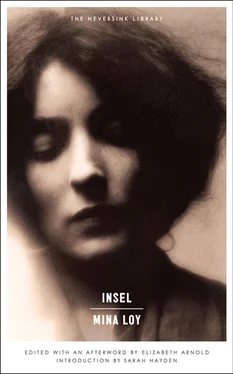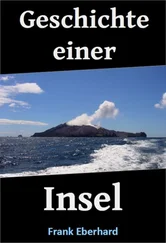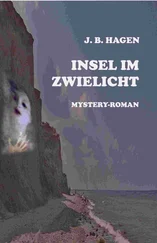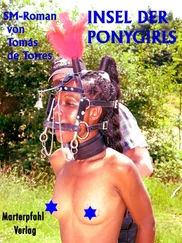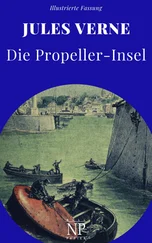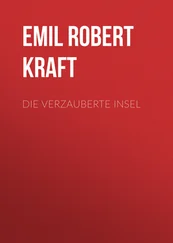[XLI]
For years, I had been submitted to the tedium of the imaginative living among races conceiving no final outlet for their dynamism but destruction, forced to inertia by the rush of intellect in the wrong direction, until the casual accident of chance threw me a dope-fiend — guinea-pig for experiment — in research on the spirit .
[XLII]
In the make-up of normal man, his good & evil are proportionately mixed. The outstanding characteristic of the drug addict is their separation; their awful alternation.
We hear that a drug in impairing nerve tissue produces a vicious exaltation & our curiosity is no further intrigued. Nevertheless I had come upon a creature of my own species intermittently enveloped in an aura identical with the atmosphere of some cathedrals in which one catches an actual detonation of a sanctity amassed through the ages.
[XLIII]
Sophia, rising from the incredible chaos she produced in the tiny bathroom, her arms white snakes ‘before the fall’, was weaving in the air the rhythm of her toilet.
Under my fingers the clammy tendrils clinging to her neck sizzled in the curling tongs. Her curses of procrastination crackled about my head while through the slab-like snow of her luminous back that faint electric ‘comfort of life’ conveyed her intrinsic aloofness of honnied marble. The silk, as if pleased to find no intervening fabric, slipped on the bare severity of her body.
I ‘do her up’.
Five strass discs confined to the acute concavity of her waist, crests of soft rocks, the pyramidal folds of a taffeta the colour of dim coal.
“Why the hell must you go and marry a great cow of a man? I’m huge!” she exploded.
The glitter of a girl prepared for a
[XLIV]
party drew the depths of her eyes to the surface. A tinge of azure underlying the shadows & roses of her skin unfolded in the beauty of her face an ineffable magnolia.
With the deep velvet of her cloak, she doused the unbroken harmonies of a figure she could not ‘see’. Her radiance flared in the slam of a door, leaving a scattered ash of toilet articles & undercloths.
I picked them up with the successive effort of manual acts performed while the brain is tracing a dissimilar diagram __ _ _ _
[XLV]
until as in the confusion of uneasy dreams I must identify that Beam controlling a surrealist man with the high-light on a fallen curler _ _ the scintilla assuming an intermediary significance __ the phosphorescent drug-addict, like a guinea-pig for experiment, flickers within range of my speculations. It is, in as far as I am aware, no particularly cleanly matter from which radium is extracted.
*
End of Book
Visitation of Insel
*
Insel is a novel written by a poet, with a poet’s interest in the sounds of words. What is at first most striking, and of special interest to readers of Loy’s poetry, is the adamantine, alliterative quality of the language here which, like the slow piling up of latinate diction and byzantine phrasing in her poems, makes Loy’s novel difficult. But what may on first reading seem byzantine and unapproachable is the very quality which gives Loy’s writing an austere beauty that repays the attentive reader. Choosing the most resistant subject matter, and employing language at once stony and visionary, she finds beatitude in the most unlikely places. Insel the clochard , the ethereal bum, belongs to a long line of materially destitute characters in whom Loy located spiritual riches.
The arduous language with which she develops Insel’s character reflects a decision to persist in the struggle to hammer the ineffable out of the hard physical matter of language, paint, stone and metal that were Loy’s media as a poet and visual artist. The narrator’s fear for Insel, and for herself as she comes under his spell, derives from Insel’s disengagement from the physical world, which — in spite of its imperfection — provides the material for art. Although she is repeatedly tempted to join Insel on his flights into the “increate,” lured by her glimpses of beauty in the perfect peace of his vision of the absolute, she is ultimately repelled by the way this vision turns one away from life rather than toward it. Her resolve to fight Insel is remarkable given the force with which his vision attracts her: “If Insel committed suicide — I could share in that, too.” The promise of a blissful reprieve from life’s suffering proves almost too great a temptation for the narrator, who later will need to weave her disintegrated self back together after an outing with Insel.
But just as the mantras of “timeless peace,” “perfect happiness,” blooming fragrance and space are about to pull her under, she happens to glance at a cafe clock, on whose “uncompromising dial all things converged to normal.” “In my veritable seances with Insel, the clock alone retrieved me from nonentity — thrusting its real face into mine as reminder of the temporal.” This periodic attention to the clock prevents her from merging with the otherworldly Insel, who seems to be on his way out of life, having relinquished his right to secular existence. Frequent appointments with friends and other artists — a relentless schedule — provide a structure within which the narrator can both experience Insel’s world from a safe distance and maintain the balance necessary to record her experience of his “Edenic region of unreasoning bliss,” which in spite of its destructiveness she values. In her description, Insel visualizes “the mists of chaos curdling into shape ,” just as she herself seeks to evoke “a chaos from which I could draw forth incipient form.” The narrator consistently pushes the “procreational chaotic vapor” that threatens to destroy both Insel and herself in the direction of artistic form. It is no surprise, then, that the narrator’s final victory over Insel — the definitive moment of the book — coincides with her success as a writer. By the end of the novel, she has reached the necessary compromise for the practicing artist: to make the most of the flawed human condition, to refine as much as possible the imperfect media available to the artist in this world. She encourages Insel to do the same, to get back to his painting in spite of both his financial worries and his precarious hold on reality. But she can only be sure that she herself will keep her balance; she leaves Insel at last to fend for himself.
Insel, the character, is modeled on the German surrealist painter, Richard Oelze, with whom Loy was acquainted in the mid-1930s in Paris. Rumor has it that Oelze was addicted to opium, and that Loy may have helped him recover from his addiction. Though in Insel and many of her poems Loy focuses on how decadence incapacitates the artist, she also makes a point to cast in sharp relief the actual devastation of individual lives brought about by drug addiction, poverty, and madness. Throughout her writing career, Loy gravitated toward the rockbottom of human existence for her subject matter, always struggling to locate what beauty or hope might reside there, but without romanticizing the anarchy or squalor.
Mina Loy met Oelze in 1933. By this time, she had already written two other fictional accounts of avant-garde figures she knew, neither of which was ever published. Brontolivido satirizes the Italian Futurist, F. T. Marinetti, and Colossus describes her relationship with Arthur Cravan (“Colossus” in Insel ), the proto-Dadaist poet whom she married in 1918. During the twenties, Loy had associated with several other expatriates living in Paris, including Ezra Pound, James Joyce, Natalie Barney, Djuna Barnes, Gertrude Stein, Constantin Brancusi, and Peggy Guggenheim (probably “Alpha” in Insel ), who helped Loy financially, arranging exhibitions of her art work and backing her lamp shade business for a time.
Читать дальше
